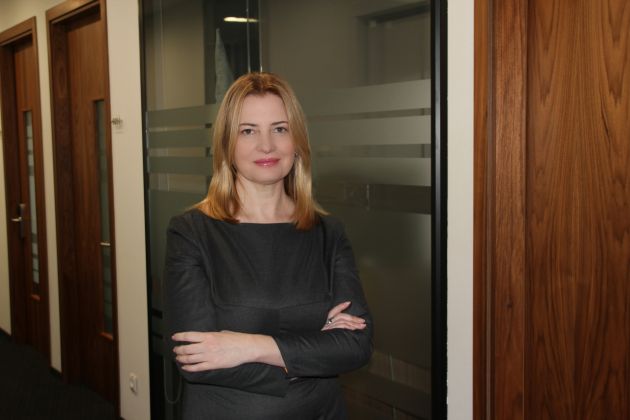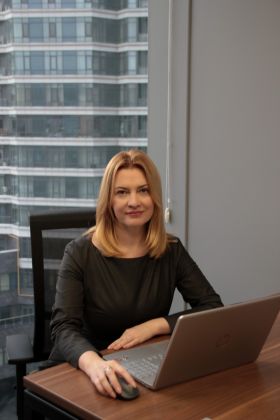 |
Маєте Телеграм? Два кліки - і ви не пропустите жодної важливої юридичної новини. Нічого зайвого, лише #самасуть. З турботою про ваш час! |
One year ago, the recognized GR-consultants Oleksandr Ilkov and Alyona Shulima announced the launch of their own company - Pragma Consulting Group. Since then, the world, and also Ukraine, has changed, and changed dramatically. Oleksandr Ilkov, a partner in Pragma, as a volunteer joined the Armed Forces of Ukraine. The economic front is being controlled now by a “female battalion”. In this interview with Alyona Shulima you can read about what kind of year this 2022, the year of the war, was for the team, how GR practice functioned.
— Alyona, please tell what was the beginning of the full-scale war for you? How do you remember the first day of the war?
Like for all Ukrainians, this country, and, to some extent, for the entire world, as well as for our Pragma Consulting Group, the full-scale russian military aggression has cut our life, professional plans, and dreams into “before” and “after”. While in January 2022, in our previous interview for the edition of Client’s Choice (printed special issue which incidentally was delivered to our office on February 23, 2022, on the eve of the war), we discussed peculiarities of the sustainable GR-service and company positioning, then with the first explosions on February 24, the need of survival (both for people and for business), and later – the need of stabilization, both personal and that of the team and the company, became our priority. All the processes were taking place in the conditions of experiencing certain events and re-evaluating the roles – like the role of every member in the team, as well as the roles of the company in a new reality.
Several days before invasion, in our team we voiced the possibility for those colleagues who felt the need to leave Kyiv for the reasons of safety and personal psychological condition. However, on February 24, almost all of us stayed in Kyiv. During the first half of that day, we with the company’s director stayed in the office collecting necessary documents and the following several days we spent together too but in a shelter.
At the same time, we as a team kept in touch daily and are still in contact now. Then, on those first days, it was the most important from the human point of view, while a bit later – from the point of view of preserving our team which at that stage - although we were already working as a team – only started recognizing ourselves as a Pragma staff team.
— When were you able to resume your work?
— In terms of interaction with representatives of client companies, we did not stopped it from the start of the war. Although at the beginning, interaction had mostly human and logistic aspects. Communications were maintained in compliance with our conditional internal distribution of duties. To put it simple, on the first days each of us stayed in contact with the clients and their representatives to whom he/she was providing support previously. We provided assistance to many international companies having representative offices in Ukraine, first of all, with establishing communication with their head offices concerning exit from or termination of operations of their representative offices on the territory of the aggressor country. The first day of the war required active consulting work in transportation field and later – in food-related retail sector.
Systemic work with clients began in the first week of March. By then, the government had already passed a set of resolutions that became the first roadmap for business in the conditions of martial law, and on March 03, 2022, the Parliament met for the first session since February 24. Accordingly, from March 04, we started updating our clients regularly on the adopted legislative initiatives in the form of brief ad hoc reviews. This work was highly important at that time, as the responsible managers in our client companies were involved in some humanitarian initiatives and while coordinating the operational assistance, they were on the roads of Ukraine most of their time, so they could not monitor the regulatory developments. We understood that it was extremely difficult for them to stay updated on the latest legislative news and to keep abreast. The project work with some clients began recovering also in the first week of March.
— What about Oleksandr Ilkov?
— Oleksandr Ilkov, a partner in Pragma, as a volunteer joined the Armed Forces of Ukraine on the first days of March. Since December 2022, he has been in a military service at the law department of the Ministry of Defense of Ukraine. The economic front is being controlled now by a “female battalion” consisting of me, the counsellor Olena Yaliyeva, and the director Nataliia Hannytsia.
— What period was the most challenging for the company? And why?
— The period from the moment the martial law was declared, in my opinion, can be divided into three stages that to certain extent coincide with the seasons.
Spring 2022 was for us, as well as probably for Ukraine too, the test for endurance and self-awareness. Some companies kept their contracts unchanged, while, at the same time or closer to the end of March, several other companies informed us of suspension or partial suspension of their contracts having stressed the importance of support to their local staff. At the same time, we had significant scope of project work remaining and we had to accumulate our efforts to proceed with providing services at high level.
To provide GR-service in first months of the war was a special task due to lack of information, low level of predictability of government decisions and extremely short timeframes (shorter even than our operational deadlines in the peaceful time). For me personally, it became also a challenge to keep Pragma going as a company, as well as to adapt to that part of our clients and client requests which were consulted and advocated by Oleksandr Ilkov. Sometimes, it was not easy considering that before the war the clients and works were distributed based on different styles of consulting and advocacy, those in new reality required to be combined quickly. It was a challenge for our team too. Each of us was making personal decision whether to stay with Pragma and in Ukraine at all. I am proud that our team as one has chosen to have the future with Ukraine and to live this year together in Pragma company. We managed to achieve to be the company, organize the work in the wartime conditions, and have active daily interaction complementing each other and sharing mutual support.
Summer 2022 brought other significant challenges aimed at long term stabilization of operational activities of the company.
And from August 2022 to December 2022, we had already a rather ambitious task to complete or actively promote not only consulting services on the wartime specific matters, but also the GR-services that were suspended at the beginning of the large-scale invasion. And we did it.
Every stage had its own difficulties. Understanding the value of the first two, now I can say with certainty that the third stage, other than difficulties, allowed us to achieve positive results and to lay foundation for the coming year. In summary, we have become sure of efficiency of the forms of cooperation we have chosen and convinced in our own endurance during this professional marathon in new conditions.
— How is the company’s operation organized now?
— We work in Kyiv combining “in office” and distance format. We plan to work several days a week from our office and as to the other days it would be optional. This approach allows us to gain balance between live communication and preservation of inner resource in the conditions of the ongoing war and shelling. We try to sort out the tasks respectively identifying those that need to be discussed or need privacy. If the colleagues leave abroad, they can work remotely. The main requirement to each of us is to be ready to be involved in the workflow regardless of the place where you are.
If we compare this new format with the work before the war, we can say that over these war months we have become more open one to the other, as we have covered this way together. To regain our strength to work in a new business season, we even organized a joint trip abroad in August, that was a chance for us all to reboot while having off-the-work communication at the same time.
— How difficult is it to work in the format of boutique in the conditions of the full-scale war?
— In my opinion, working in the conditions of the ongoing war is difficult regardless of the format. As to the peculiarities of the specifically consulting boutique operation in wartime, the degree of exposure of this form of business depends mostly on the fact whether there is still the demand for the services of the company on the market in general and from the clients in particular. At the same time small size of the company can be an advantage in the period of crisis.
Frankly speaking, we have spent this year focused more on our own projects than watching our counterparts on the market. The results of the legal services market analysis made with the participation of your edition give me grounds to state that our GR-boutique passes this way facing no more difficulties than the legal market in general and some GR-practices of legal companies. It is mostly thanks to our clients who generate their requests and entrust us their projects in this difficult period and to our team which is focused on providing high-quality services.
— How high is the demand for GR-practice now?
— Any dynamic events and non-standard conditions make government relations an important aspect for business. Even more than that – request for GR-products acquires importance both for business and for the state. Since political and regulatory decisions have to be made quickly and at the same time professionally, and, ideally, the practical impact of such decisions has to be taken into account from the very beginning, and therefore it requires quick internal analysis.
In wartime, business becomes more sensitive to the degree of how well verified government decisions would be, and sometimes initiates certain changes necessary for its functioning (and even survival) during martial law. In these conditions, the demand for GR is certainly developing and even growing. Although, it should be noted that it can be seen in the companies and industries that had a positive experience of cooperation in the GR field before the war.
— How do you help your clients now? Have their requests changed in wartime?
— Our current projects can be divided into three groups. The first group is a completion of reforms launched before the war taking into account new challenges and new responsibilities vested on business and us as the consultants in the current conditions. We should especially note a powerful reform in natural resources management, the legal support of which has become for me the important social regulatory impact this year. The second group – involvement -to the new initiatives arising from the candidacy of Ukraine in the EU. The third group – current operational challenges arising from martial law – related conditions, like, e.g. logistic problems, lack of fuel, blackout.
A part of the tasks that, unfortunately, we encounter in wartime is identification and counteraction to the attempts of a certain industry or a group of companies to encourage disproportional or corruption regulation. Since our work as an integral part by default implies monitoring of regulatory initiatives, the identification of such cases in the conditions when chains of regular government safeguards can be slowed down because of the multiple priority military tasks has also a certain social preventive function.
— Do you receive requests from foreign companies? What sectors of the economy require more of GR?
— We continue working with some foreign companies and from the beginning of 2023 we resume our cooperation with some companies that suspended their operations in the first month of the war. Concerning the sectors of the economy, GR is traditionally required by excisable businesses, and in the conditions of implementation of the European legislation and dynamic postwar changes in the regulatory field, the need in interaction with government authorities will grow almost in all sectors.
At the same time, the specific wartime feature worth mentioning is the significant demand for efficient GR-support of business in the retail sector. The industry, which was usually developing in free market conditions and that existed actually in parallel with the state, at the beginning of the war became one of the first objects of the regulation (in particular, the government imposed restrictions on the margin for socially significant goods and settlement terms for such goods) and being the final link of the food products chain, actually accumulated all negative of liquidity fall in this part.
On the other hand, it is the retail chains that assumed a significant part of the social function having practically independently provided access for the population to essential goods in the first days of the war. They are still doing it today restoring shops in de-occupied cities and towns and working in the conditions of blackout. Over the year, the retail sector has become gradually, in particular, due to communications via specialized and business associations, not only the object but also the subject of interaction with the government authorities. Today, some official documents have already recognized the food products retail as the sector of critical infrastructure. The task for the next period is to strengthen retail as such in the day-to-day understanding of the government authorities’ representatives involved in shaping the state policy in this sector.
— What challenges does the partner of the company face today?
— The main challenge for me as the partner of the company is not just to maintain the business at the level of high quality, ethical service and ecological internal culture, but also to have time to develop the company, team, and myself. In 2022, we surely became stronger. I believe that the year 2023 will give our team a chance to enhance our knowledge and competence, scale consulting practice.
— What helps you to save resource and morale?
— As to the resource, I personally find it mostly in implementing our projects. It includes communication with special people with whom I share the same values both in the team and outside. If outside of the business processes, I find emotional source and source of energy in communication within the community and team of the public restaurant Urban Space 500 which I have been supporting for several years now. This summer, the restaurant with the support of the donor project was operating like the Culture and Art War Hub, and since October it has been a real station of invincibility in downtown Kyiv. Of course, regular support comes from my friends, most of whom stay and work in Kyiv, and my daughter who is a Bachelor’s graduate in some other state.
— What are the plans of Pragma Consulting Group for 2023?
— We will do everything possible to provide further high-quality services of government relations in Ukraine during wartime as our contribution to the Victory. In interaction with government authorities, the war also makes growing and gradually more obvious emphasis on the elements of expert relations as the civilizational choice in favour of conscious business influence on shaping the sectoral policy by the state.
It is through the establishment of expert coalitions and day-to-day cooperation with business associations, industry business unions, consulting boards under government authorities to support legislative initiatives that we see our current contribution to the restoration of Ukraine.
Development of a “club type” company which we with Oleksandr Ilkov tried to start up at the stage when Pragma was created is still the most comfortable and effective form of cooperation of powerful persons, as well as the most flexible business format for any transformation. Sometimes due to external circumstances we could not have used this year in full for each of our team members as we planned. But we have surely become stronger – each of us has discovered in him/her and in collective cooperation some new powerful and valuable qualities. That’s why, as I mentioned earlier, I would strongly wish the year 2023, for each of us and for the company as a whole, to become the year of development and broadening the horizons.
— How do you visualize the market after the war?
— I think the postwar period will become one more difficult test for Ukraine, as a whole, and for the market of consulting services, in particular. The market will have to live through significant market distortions that would be based, on one hand, on limited resources, and from the other hand, on their disproportional distributions in postwar Ukraine. I would like to wish us all in the future (the soonest possible, I hope) to overcome the testing at a high professional, civilizational, and value-oriented level. I mean for us to survive with dignity not only the war, but also the period of economic restoration of Ukraine both at the state and business level.






